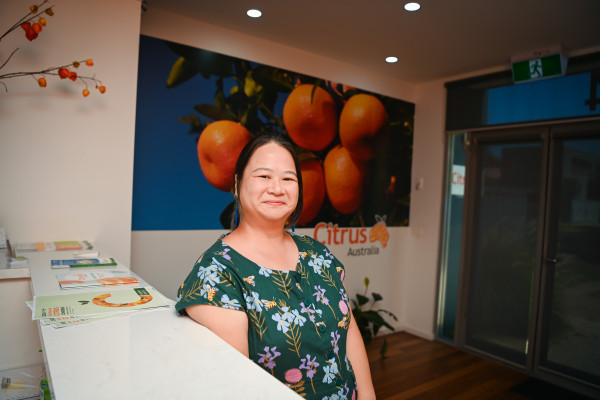JACQUI Mitchell is under no illusions about the importance of her new biosecurity role with Citrus Australia, based in Mildura in the heart of some of the nation’s biggest citrus-growing regions.
Just as she knows the next big threat to that industry is likely to slip quietly through the back door instead of attacking the large-scale commercial industry.
And her move south from Darwin to take on the responsibility has put her at the front line of the future of that industry.
As the citrus urban biosecurity co-ordinator, working alongside Citrus Australia biosecurity manager Jessica Lye to promote the importance of a robust biosecurity system and improve industry preparedness in the event of an incursion, Ms Mitchell certainly has her hands full.
Her key responsibility will be engaging with urban communities in high-density areas to encourage the monitoring of pests and diseases such as huanglongbing and Asian citrus psyllid through CitrusWatch’s early detector network.
With varroa mite finally breaking into Australia last year, and swine fever and lumpy skin disease reaching neighbouring countries, Ms Mitchell said the last thing anyone wanted to see are devastating citrus diseases also getting established here.
“The CitrusWatch program aims to ensure the Australian citrus industry is better equipped to minimise the entry and spread of high-priority pests through surveillance, research, training and education,” she said.
“Through the Early Detector Network we distribute trapping kits to urban communities to help monitor pests and diseases in high traffic areas, which are likely to be the pathway of entry for these threats.”
Ms Mitchell also brings a wealth of knowledge to the role. She holds a bachelor of science degree, a Certificate IV in Training and Assessment and a Certificate III in Horticulture, along with qualifications in retail nursery, rural operations and conservation and ecosystem management.
She spent the past two years as a TAFE horticulture lecturer at Charles Darwin University.
“A career highlight would be the several weeks I spent in Kakadu over the wet season, doing horticulture and conservation training with some of the local people,” Ms Mitchell said.
“We had a grand adventure collecting and propagating local species, learning how to care for them.”
Ms Mitchell relocated from Darwin about two months ago – along with her cheeky blue heeler named Poppy, trading crocodiles, waterfalls and termite mounds for desert plains, the Murray-Darling and citrus orchards.
“I love to garden and I love sharing knowledge, so community engagement for something as important as biosecurity brings together many things that I am passionate about,” Ms Mitchell said.
“The key to a great garden is a healthy garden and if we have healthy gardens through good biosecurity practices we can keep our growers and citrus industry safe.”
A self-confessed “foodie and a craft hoarder”, Ms Mitchell said she was happy to have settled in the Murray Valley and looked forward to learning more about how the Australian citrus industry operates.
“When you live in a regional area, you get to see and experience things you don’t hear about on tourism ads or Instagram,” she said.
“I drove from Darwin to get here and found a lot of cool things along the way that I wouldn’t know about if I had flown down.
“I’m really looking forward to exploring the tri-state area.”
DON’T MISS NEXT WEEK’S NORTH WEST FARMER FOR A FEATURE ON CITRUS BIOSECURITY’S NEW FACE
















